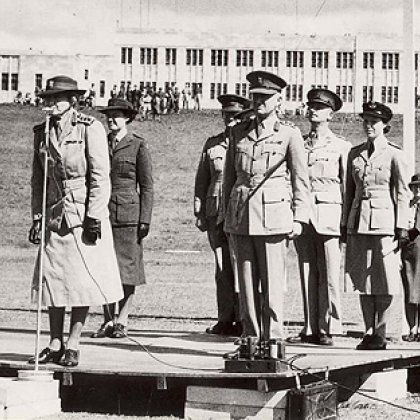
The controversial cultural history of Allied Servicewomen during World War II will be explored in a free research seminar at UQ on Friday, October 23.
UQ Associate Professor Chris Dixon will present a seminar paper entitled Brazen, Shameless Hussies?: Images and Experiences of Allied Servicewomen in the South Pacific, 1941-1945 at 1pm.
The seminar is based on a research paper co-written with Associate Professor Sean Brawley (University of NSW) that examines the practices adopted by United States military authorities to “manage” women under their command.
“To some servicemen, women’s presence in the South Pacific was premised not on their contribution to the military campaign, but on the sexual services they provided to Allied servicemen,” Dr Dixon said.
Dr Dixon’s interest in the Pacific War has grown out of a long-standing fascination with the cultural and social aspects of war, a significant theme of his latest research.
“I seek to learn more about the preconceptions and assumptions that Allied service personnel took with them to the South Pacific during World War II,” he said.
Co-ordinator of the UQ Cultural History Project, Dr Dixon’s most recent book, Competing Voices from the Pacific War, co-written with Associate Professor Brawley and Dr Beatrice Trefalt (Monash University), considers the different types of sources that historians can exploit in studying the Second World War.
“Alongside ’traditional’ sources such as official documents, and correspondence between government and military officials, we examine more personal, private sources that cast light on the emotions as well as the actions of those caught up in one of the twentieth century's most brutal conflicts,” Dr Dixon said.
Dr Dixon said another important part of the study involved examining sources left by Japanese civilians and soldiers.
The seminar suggests that despite the best efforts of Allied military leaders to preserve popular views of “womanhood”, some servicemen were convinced that female service personnel were violating prevailing images of femininity and womanhood.
“Some men even regarded Allied servicewomen as little different from the so-called ‘comfort women’ of their Japanese enemy,” Dr Dixon said.
The free seminar will be held from 1pm–2pm in Michie Building, room 203. All are welcome.
Media: Associate Professor Dixon (07 3365 2162, c.dixon1@uq.edu.au) or Trudi Saul at UQ Communications (trudi.saul@uqconnect.edu.au)
.jpg)



